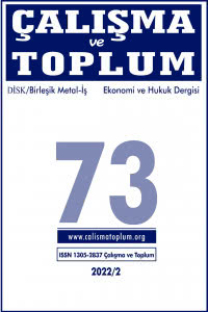Küreselleşme, Servet Eşitsizliği ve Demokrasi Üçgeni Üzerine
Servet eşitsizliği, Siyasal meşruiyet, Yükselen ekonomiler, Gelişmiş ülkeler, Türkiye
On the Globalization, Wealth Inequality and Democracy Triangle
___
- Acemoğlu, D., Naidu, S., Restrepo, P. Ve Robinson, J. (2015) “Democracy, Redistribution, and Inequality”, Handbook of Income Distribution, 2, 1885– 966.
- Addo FR. (2014) “Debt, Cohabitation, and Marriage in Young Adulthood”, Demography, 51(5), 1677–701.
- Allianz. (2017) “Global Wealth Report 2017”. 9 Aralık 2018 tarihinde: https://www.allianz.com/content/dam/onemarketing/azcom/Allianz_co m/migration/media/economic_research/publications/specials/en/AGW R_17_english.pdf.
- Attanasio O.P. Ve Hoynes, H.W. (2000) “Differential Mortality and Wealth Accumulation”, Journal of Human Resources, 35(1), 1–29.
- Bond Huie, S.A., Krueger, P.M., Rogers, R.G. Ve Hummer, R.A. (2003) “Wealth, Race, and Mortality”, Social Sciences Quarterly, 84(3), 667–84.
- Capgemini. (2018) “World Wealth Report”, 9 Aralık 2018 tarihinde: https://www.worldwealthreport.com/download.
- Collins, C. (2012) 99 to 1: How Wealth Inequality is Wrecking the World and What Can We Do About It?, New Economy Working Group.
- Conley, D. (1999) Being Black, Living in the Red: Race,Wealth, and Social Policy in America. Berkeley: University of California Press.
- Credit Suisse. (2014) “Global Wealth Databook 2014”, 9 Aralık 2018 tarihinde: http://piketty.pse.ens.fr/files/CSGlobalWealthDatabookOctober2014.pdf.
- Credit Suisse. (2016) “Global Wealth Report 2016”, 9 Aralık 2018 tarihinde: http://www.db.zs-intern.de/uploads/1479892972-GlobalWealthReport2016.pdf.
- Credit Suisse. (2017) “Global Wealth Report 2017”, 9 Aralık 2018 tarihinde: https://static.poder360.com.br/2017/11/global-wealth-report-2017-en.pdf.
- Davies, J.B., Lluberas, R., Ve Shorrocks, A.F. (2017) “Estimating The Level and Distribution of Global Wealth, 2000-2014”, Review of Income and Wealth, 63(4), DOI: 10.1111/roiw.12318.
- Di Matteo, L. (2018) The Evolution and Determinants of Wealth Inequality in the North Atlantic Anglo-Sphere, 1668–2013, Palgrave Pivot.
- Doren, C. Ve Grodsky, E. (2016) “What Skills Can Buy: Transmission of Advantage Through Cognitive and Noncognitive Skills, Sociological Education, 89(4), 321–42.
- Friedline, T., Masa, R.D. Ve Chowa, G.A.N. (2015) “Transforming Wealth: Using the Inverse Hyperbolic Sine (IHS) and Splines to Predict Youth’s Math Achievement”, Social Science Research, 49, 264–87.
- Haggard, S. Ve Kaufman, R. (2012) “Inequality and Regime Change: Democratic Transitions and the Stability of Democratic Rule”, American Political Science Review, 106, 495–516.
- Hurd, M. Ve Kapteyn, A. (2003) “Health, Wealth, and the Role of Institutions”, Journal of Human Resources, 38(2), 386–415.
- Jez, S.J. (2014) “The Differential Impact of Wealth versus Income in the College- going Process”, Research in Higher Education, 55(7), 710–34.
- Jones, J. Ve Smith, J. (2014) A College Degree is No Guarantee, Center for Economic and Policy Research.
- Keister, L.A. (2014) "The One Percent.", The Annual Review of Sociology, 40, 347-67.
- Killewald, A., Pfeffer, F.T., Ve Schachner, J.N. (2017) “Wealth Inequality and Accumulation”, Annual Review of Sociology, 43, 379–404.
- Murtin, F. Ve d’Ercole, M.M. (2015) Household Wealth Inequality Across OECD Countries: New OECD Evidence, OECD Statistics Brief, 21.
- Nau, M., Dwyer, R.E. Ve Hodson, R. (2015) “Can’t Afford a Baby? Debt and Young Americans”, Research in Social Stratification and Mobility, 42, 114–22.
- Öniş, Z. Ve Kutlay, M. (2013) “Rising Powers in a Changing Global Order: The Political Economy of Turkey in the Age of BRICS”, Third World Quarterly, 34(8).
- Öniş, Z. (2014) “Küreselleşme, Gelir Adaletsizliği ve Demokrasinin Geleceği: Kriz Sonrası Eğilimler”, İktisat ve Toplum, 47.
- Öniş, Z. (2016) “Democracy in Uncertain Times: Inequality and Democratic Development in the Global North and Global South”, METU Studies in Development, 23, 317-336. http://dx.doi.org/10.2139/ssrn.2641477
- Öniş, Z. (2017) “The Age of Anxiety: The Crisis of Liberal Democracy in a Post Hegemonic Global Order”, The International Spectator, 52, 3.
- Öniş, Z. (2018) “Turkey under the Challenge of State Capitalism: The Political Economy of the Late AKP Era", Southeast European and Black Sea Studies (inceleme aşamasında)
- Pfeffer F.T. (2011) “Status Attainment and Wealth in the United States and Germany”, T.M Smeeding, R Erikson, M. J¨antti (der.) Persistence, Privilege, and Parenting: The Comparative Study of Intergenerational Mobility içinde, New York: Russell Sage Found, 109–137.
- Saez, E. Ve Zucman, G. (2016) “Wealth Inequality in the United States since 1913: Evidence from Capitalized Income Tax Data”, Quarterly Journal of Economics, 131(2), 519–578.
- Scheve, K. Ve Stasavage, D. (2017) “Wealth Inequality and Democracy”, Annual Review of Political Science, 20, 451-468.
- Schneider, D. (2011) “Wealth and the Marital Divide”, American Journal of Sociology, 117(2), 627–67.
- Semyonov, M. Ve Lewin-Epstein, N. (2013) “Ways to Richness: Determination of Household Wealth in 16 Countries”, European Sociological Review, 29(6), 1134–48
- Shapiro, T. (2004) The Hidden Cost of Being African American, Oxford University Press.
- Torul, O. Ve Öztunalı, O. (2018) “On Income and Wealth Inequality in Turkey”,
- World Inequality Lab. (2018) “World Inequality Report”. 9 Aralık 2018 tarihinde: https://wir2018.wid.world/files/download/wir2018-full-report- english.pdf.
- ISSN: 1305-2837
- Yayın Aralığı: 4
- Başlangıç: 2003
- Yayıncı: DİSK Birleşik Metal-İş
Yeni Anayasa ve Yeni Devlet Yapılanması
zun Durgunluk ya da Yapısal Kriz: Kriz İktidarının Krizine Dair Gözlemler
Serdar BAHÇE, Ahmet Haşim KÖSE
Sermeye Hareketleri ve Türkiye’nin Beş Krizi
Crises, Restructuring and The Legitimacy of Capitalism
Jayati GHOSH, C. P. CHANDRASEKHAR
Küreselleşme, Kriz ve Borçlanma: Türkiye Ekonomisi Üzerine Bir Analiz
Türkiye’de Genç İstihdamının Bölgesel ve Etnik Değişimi 2012-2016
Türkiye’de Genç İstihdamının Bölgesel ve Etnik Değişimi (2012-2016)
Küreselleşme, Servet Eşitsizliği ve Demokrasi Üçgeni Üzerine
Küreselleşme, Unutulan Sanayi Politikaları ve Sanayisizleşme
